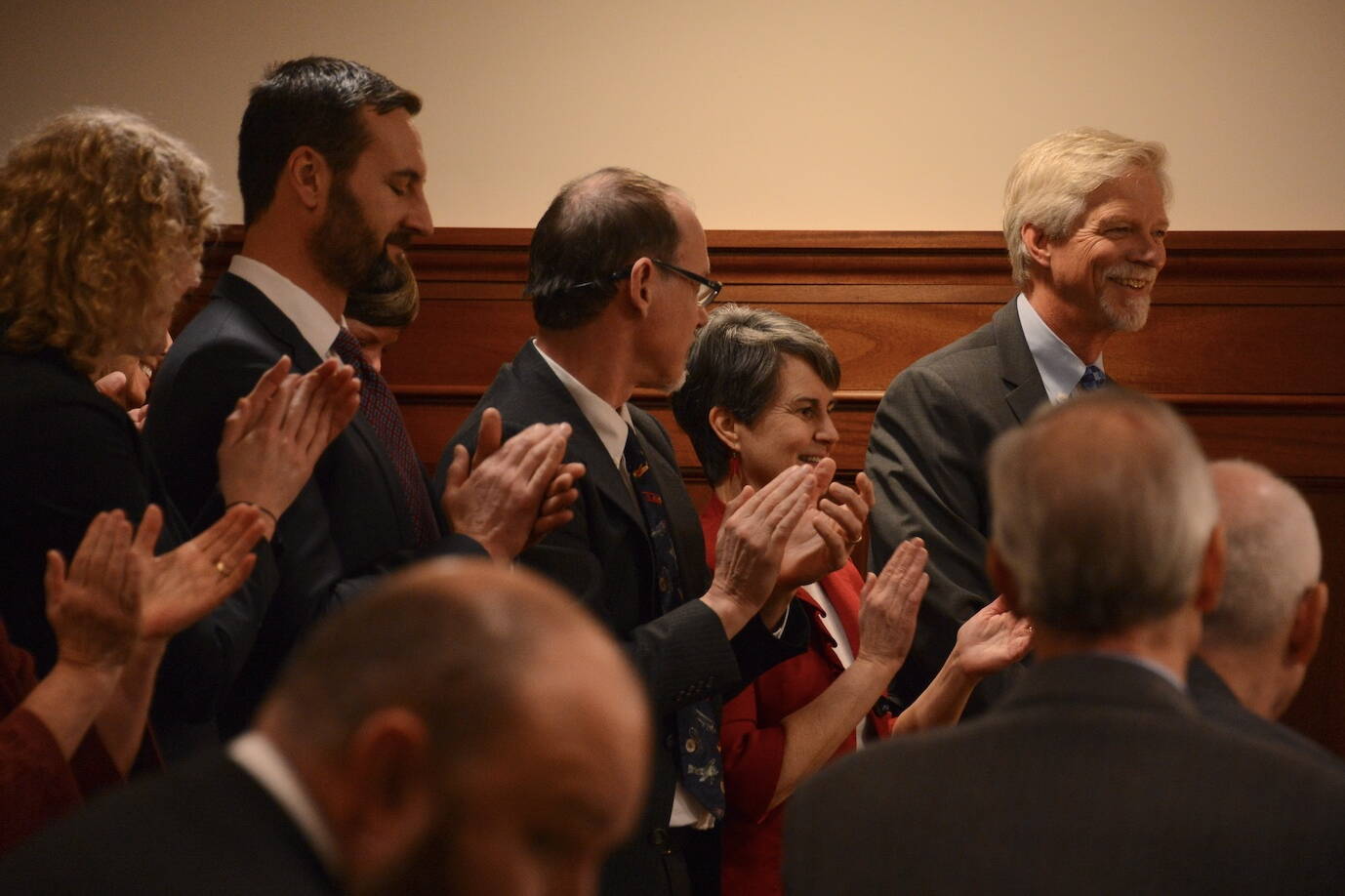Correction: The person selected for the Supreme Court will be subject to a statewide vote in 2028, not 2026. A retention vote takes place in the first general election held more than three years after appointment. It has also been updated to reflect that Gov. Mike Dunleavy was not among the Republicans who indicated they would like to appoint more Republican justices. The initial version of this article was incorrect.
A wave of retirements on the Alaska Supreme Court is nearing its end.
On Friday, the Alaska Judicial Council announced that it is accepting applications from attorneys and judges interested in replacing Justice Peter Maassen, who will turn 70 — the age limit for Supreme Court justices — early next year.
When Gov. Mike Dunleavy picks Maassen’s replacement from a list of finalists chosen by the Alaska Judicial Council later this year, the governor will have selected four of the five judges on Alaska’s high court.
Last January, Dunleavy picked Jude Pate of Sitka for the high court. It was the first time since 1960 that a judge had been selected from a place other than Anchorage, Juneau or Fairbanks.
The governor picked Dario Borghesan, a former assistant attorney general, for the court in 2020. In 2021, he selected Anchorage Superior Court Judge Jennifer Henderson.
Justice Susan Carney, appointed by former Gov. Bill Walker in 2016, will be the only non-Dunleavy pick on the high court. She will not turn 70 until 2031.
Maassen is the state’s current chief justice, but unlike in the U.S. Supreme Court, the chief justice of the Alaska court is a role that rotates among all five justices, with the Alaska chief decided by a vote of the court’s members.
Under the Alaska Constitution, judicial vacancies are filled by a multi-part process. Applicants have until July 12 to submit an application packet to the Alaska Judicial Council.
That six-member panel includes three public members appointed by the governor and three attorneys appointed by the Alaska Bar Association.
The council will vote in November to pick a list of the most qualified candidates, and that list will be sent to the governor for final selection.
The Alaska Constitution requires judges to be selected on the basis of merit and skill, rather than politics, and if the council splits 3-3 on an applicant, the current chief justice casts a tie-breaking vote.
Republicans, including Dunleavy, have occasionally voiced dissatisfaction with the system. Some Republicans, including Sen. Mike Shower, R-Wasilla, have said they would prefer to appoint Republicans, regardless of the council’s merit selection.
In 2021, Dunleavy asked for additional Supreme Court nominees after the council’s list failed to include Kotzebue Judge Paul Roetman, a graduate of a Christian law school in Virginia.
The council’s bylaws do not allow them to reconsider a list of nominees except in cases where a nominee becomes unavailable and leaves the governor with fewer than two choices.
Dunleavy picked from the original list after the council declined to offer new choices.
Nominees must have been a resident of Alaska for at least five years at the time of appointment, have actively practiced law for at least eight years and be licensed to practice law in Alaska.
The council conducts a statewide survey of attorneys and asks them to rank the applicants on their legal skill and suitability for a seat on the Supreme Court. The council also conducts a background investigation, including criminal and credit checks.
A public hearing, including written and spoken input, will take place in November, council staff said in Friday’s announcement.
The governor will have 45 days to make a final selection once the council picks the list of nominees in November.
The ultimate selection will be subject to a statewide retention vote in the 2028 general election.
• James Brooks is a longtime Alaska reporter, having previously worked at the Anchorage Daily News, Juneau Empire, Kodiak Mirror and Fairbanks Daily News-Miner. This article originally appeared online at alaskabeacon.com. Alaska Beacon, an affiliate of States Newsroom, is an independent, nonpartisan news organization focused on connecting Alaskans to their state government.

